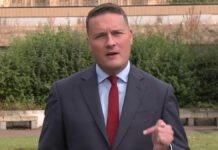Hancock: ‘We did not go into this crisis with the capacity for a response’
Government unveils its new National Institute for Health Protection, setting out his plans, Hancock admitted that the country did not go ‘into this crisis with the capacity for a response to a once in a century-scale event’.
The UK Government has created its new National Institute for Health Protection (NIHP), which will start work immediately, with a single command structure to advance the country’s response to the coronavirus pandemic.
Under the new organisation, the efforts of Public Health England and NHS Test and Trace will be brought together, as well as the analytical capability of the Joint Biosecurity Centre (JBC) under a single leadership team.
The claim is it represents the first step towards becoming a single organisation, focused on tackling Covid-19 and protecting the nation’s health.
As an effort to minimise disruption to the vital work dealing with the pandemic, the organisation will be formalised and operating from Spring 2021.
Hancock confirmed that Baroness Dido Harding, the current boss of failing NHS test and trace system, would lead the new organisation. Critics have questioned her suitability for the role given the test and trace operation’s poor track record in tracking down carriers of coronavirus, getting them tested and disclosing the details of their close contacts.
Coincidentally the former TalkTalk chief executive Baroness Dido Harding is married to John Penrose, a Tory MP and former minister. John Penrose sits on the advisory board of think tank “1828”, which “calls for the NHS to be replaced by an insurance system and for Public Health England to be scrapped.
The new organisation will support local directors of public health and local authorities on the frontline of the Covid-19 response. Key responsibilities of the new NIHP will include:
- NIHP local health protection teams to deal with infections and other threats
- support and resources for local authorities to manage local outbreaks
- the COVID-19 testing programme
- contact tracing
- the Joint Biosecurity Centre
- emergency response and preparedness to deal with the most severe incidents at national and local level
- research and reference laboratories and associated services
- specialist epidemiology and surveillance of all infectious diseases
- the Centre for Radiation, Chemical and Environmental Hazards
- global health security
- providing specialistic scientific advice on immunisation and countermeasures
Health Secretary Matt Hancock said: “To give ourselves the best chance of beating this virus once and for all – and of spotting and being ready to respond to other health threats, now and in the future – we are creating a brand new organisation to provide a new approach to public health protection and resilience.
“The National Institute for Health Protection will bring together the expertise of PHE with the enormous response capabilities of NHS Test and Trace and the Joint Biosecurity Centre to put us in the best possible position for the next stage of the fight against COVID-19 and for the long term.
“I want to thank all my brilliant colleagues at Public Health England, the NHS, the Joint Biosecurity Centre, local directors of public health and their teams, contact tracers, diagnostics experts, epidemiologists, infection control teams, and every single person who has contributed to the national effort to get this deadly pandemic under control over the last 8 months.
“I would like to personally thank Duncan Selbie for his leadership of PHE bringing together 70 different agencies, pursuing ground-breaking work on tackling obesity, promoting health improvement and leading PHE, in what has been an exceptionally challenging time. I am looking forward to continuing working with him as a leading figure in the global, public health agenda.”
The NIHP will be a new organisation whose primary focus is to ensure we have the best capability to control infectious disease and deal with pandemics or health protection crises.
It will take on existing UK-wide responsibilities and it will work with local government, the NHS and the devolved administrations to ensure we have the strongest possible health protection system for the whole of the UK. It will build on the existing strong working relationships between the four nations of the UK, including on data-sharing, alert levels and border issues.
It will report directly to the Health and Care Secretary and support the clinical leadership of the four UK chief medical officers.
The government is immediately bringing together PHE, NHS Test and Trace and the Joint Biosecurity Centre under the interim leadership of Baroness Dido Harding, with a single command structure and operating model to tackle the Covid-19 pandemic.
Criticisms have been rolling in from experts and shadow ministers about the timing of Matt Hancock’s announcement that Public Health England is to be scrapped.
Shadow public health minister, Alex Norris, described it as “a desperate attempt to shift the blame after years of cutting public health budgets”.
He added that what was needed instead of a new body, was “an effective local test-and-trace system that delivers mass testing and case finding.”
“Matt Hancock himself was responsible for Public Health England and in setting PHE’s priorities last year – ministers didn’t even mention preparing for a pandemic.”
Richard Murray, the chief executive of the King’s Fund health thinktank, said the public body had been “found guilty without a trial”.
“It is unclear what problem [the] government are hoping to solve by carving up PHE and redistributing its responsibilities,” he added.
“Undoubtedly, there are questions to be answered about England’s handling of the Covid-19 crisis, but the middle of a pandemic is not the time to dismantle England’s public health agency.”
Meanwhile, Richard Tedder, a visiting professor in medical virology at Imperial College London, told the BBC that PHE was an “assembly of some of the wisest and most committed microbiologists and epidemiologists you could hope for anywhere”.
He also warned that the plans to merge existing laboratory staff with NHS test and trace would dismantle the “irreplaceable” expertise within PHE.
Help Us Sustain Ad-Free Journalism
Sorry, I Need To Put Out the Begging Bowl
Independent Journalism Needs You
Our unwavering dedication is to provide you with unbiased news, diverse perspectives, and insightful opinions. We're on a mission to ensure that those in positions of power are held accountable for their actions, but we can't do it alone. Labour Heartlands is primarily funded by me, Paul Knaggs, and by the generous contributions of readers like you. Your donations keep us going and help us uphold the principles of independent journalism. Join us in our quest for truth, transparency, and accountability – donate today and be a part of our mission!
Like everyone else, we're facing challenges, and we need your help to stay online and continue providing crucial journalism. Every contribution, no matter how small, goes a long way in helping us thrive. By becoming one of our donors, you become a vital part of our mission to uncover the truth and uphold the values of democracy.
While we maintain our independence from political affiliations, we stand united against corruption, injustice, and the erosion of free speech, truth, and democracy. We believe in the power of accurate information in a democracy, and we consider facts non-negotiable.
Your support, no matter the amount, can make a significant impact. Together, we can make a difference and continue our journey toward a more informed and just society.
Thank you for supporting Labour Heartlands











